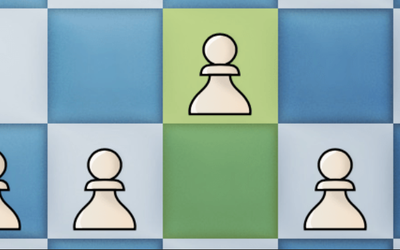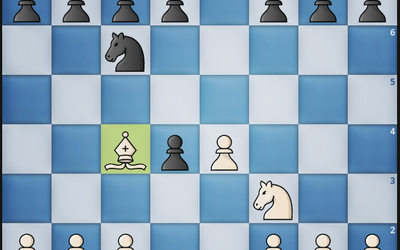
Image by Amogh Akella, 2022
Chess. Solved?
I came up with a trick that just might've solved chess. But how does it work? Is chess solved? Click on this blog post to read more."There are more possible games of Chess than atoms in the Universe”.
- Claude Shannon
Intro
What is the notion of solving chess, or a game in general? When we consider a game solved, we mean that we show that with best play, the game is a first-player win, a second-player win, or a draw.
Chess itself is not solved yet. However, it could eventually be solved, though it may take some time to do so.
About 6 months ago, I came up with an idea that I thought had solved chess. As it turns out, it almost solves chess.
Is chess solvable?
Chess is a solvable game. One way to establish this is to create an upper bound for the number of moves in a chess game. If there exists a limit (say x moves), then we can analyze any position at x ply, after which the game must've ended, therefore solving chess.
The simplest way to show that there is a bound for the number of moves in a chess game is to show that there is a finite number of positions that can be reached.
There are 64 places to put the 8 or fewer white pawns on the chessboard. Supposing there are 8 pawns, there are 64 choose 8 ways to place them on the board, and this is just in the case when we have 8 pawns. We can continue with all of the pieces to get the number of ways to randomly put pieces on the board.
We can try to compute this number, but it is huge. Indeed, this number (using a quick computation) is bigger than 10^44! While some positions are not reachable, the total number of possible positions is probably bigger than 10^40. After all, we haven't counted promotions!
So, we end up with a limit of 2*10^40 + 1 moves. Seems long, eh?
There is a slicker way to do this, though. We can utilize the 50-move rule:
If 50 moves are played, and there are no pawn moves nor captures made, the game ends in a draw.
There are a maximum of 96 pawn moves per side, and 30 captures per side. Thus, we can reset the 50-move rule at most 126 times. This means that the maximum length of a chess game is at most 6300 moves.
This number can be reduced to 5900 moves, which is an improvement on our last number, but still a huge number.
We have shown that chess is solvable, but how do we solve it?
Chess. Solved?
My idea
A couple of months ago, I came up with a new variant of chess. It's just normal chess, except on any turn, a player can choose to skip their move. It seems like normal chess, except positions, like the one below, are drawn.
In this position, black can easily draw by repeatedly skipping his move, because white cannot break through. In normal chess, however, black would be forced to play ...Ka8 and allow white to mate with Rxc8#.
There is a way to show that black cannot win this variant with best play, something that nobody has been able to do with normal chess!
Solving the variant
This variant may have even more possible games than normal chess. However, we can use a trick to solve it very fast.
For starters, assume that black wins with best play. Then, white can employ a clever strategy. He skips his first move and uses black's strategy (with a couple of flips of the board) to win the game. Black can respond by skipping himself, but then white will skip again. If black does not want to lose the game, this will continue until threefold repetition is reached, the 50-move rule is reached, or one of the players dies of old age...
Of course, this means that the game ends in a draw, therefore black did not win.
While we haven't shown that this variant is a draw, we have shown that black does not win with best play.
Is chess solved using this?
After coming up with this proof, I thought for a second that I had solved chess! After all, this variant is a lot like chess. I hadn't. But, this goes to show that chess could easily be solved using a trick rather than brute force.
Why doesn't this solve chess? Consider the following endgame:
White can win this easily in normal chess, but in the variant, black can draw as follows:
1. ... Kc8
2. Kc6 Kb8
3. <Skip><Skip>
4. Kb6 Kc8
And so on. As you can see, whenever white threatens checkmate, black moves out of it, and whenever white skips, black skips. The key thing about normal chess is that in endgames such as the above one, white wins because black is forced to make his move. So, in reality, this variant is, in fact, very much different from chess.
Will chess be solved soon?
It is unlikely that chess will be solved soon.
If you run stockfish on a complicated position for 1 day, you might get to depth 60, maybe 70 if you're lucky. While the maximum length of a chess game may not be 5900, it would probably be bigger than 500, and 60 to 500 is a colossal leap.
That being said, someone could easily use a trick and solve chess soon, so who knows? It is true, however, that games such as Nine Men's Morris (draw), Connect 4 (first player win), and Checkers (draw) have all been solved using brute force.
But do we want chess to be solved?
Here's the thing: After checkers was solved, it went down in popularity. If you ever go to the site lidraughts.org, it's exactly like lichess, except at most times there are fewer than 200 games in play. Maybe we don't want to have chess solved just yet.
Thanks for reading!
~BigBlunderGuy
lichess.org/@/BigBlunderGuy/blog

